Publishing with a small, independent press has its ups and downs
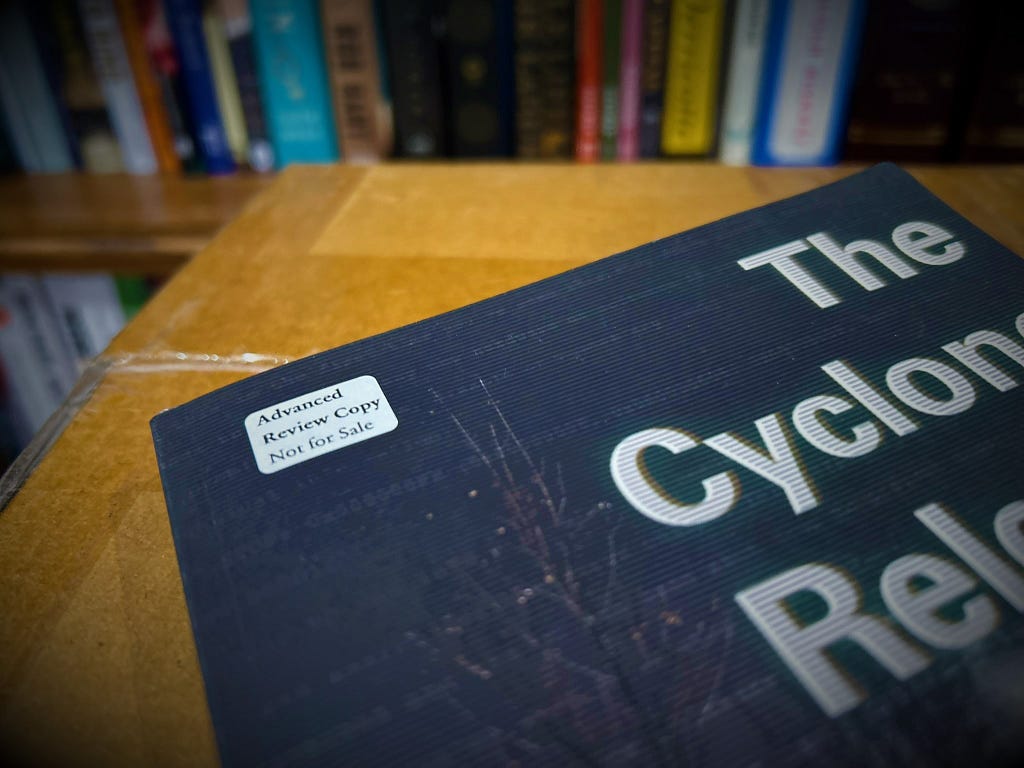
When my debut novel, The Cyclone Release, won Third Prize in Madville Publishing’s Blue Moon Novel Competition, I was elated for many reasons. First and foremost, the prize came with a publishing contract, which meant the novel on which I had labored for over a decade would finally find readers, and I would now breathe the rarefied air of the published author. More than that, winning Third Prize as opposed to First, which went to the truly fine novel Provenance by Sue Mell, meant I would have over a year to build the author platform that would be crucial to the success of the book. And working with a small publishing house would afford me creative influence that my agented friends didn’t get from the big New York publishers they had signed with.
That was a year and a half ago, and The Cyclone Release is now out in the world, so I thought I’d reflect on the experience and share some thoughts. Below are five things I’ve learned launching a book with a small publisher.
1. Don’t lose yourself in the social media vortex
Above, I mention the author platform. This is something I had blogged about three years ago after seeing a terrific presentation on the topic from the inimitable thriller writer Danielle Girard, who continues to maintain one of the most robust author platforms I’ve seen. Most people reading Medium know what an author platform is, but just to be clear, I use the term to refer to the online and media presence, and associated brand, that an author must cultivate in order to build readership. That three-year-old blog post identifies the elements of an author platform as:
- An author website
- A blog
- Social media: Facebook, Twitter, and Instagram, at minimum
- An email list and newsletter
I used the time I had before the launch of The Cyclone Release to create a robust author website using Squarespace, to build an e-mail list I use to send out monthly newsletters, to migrate my longstanding Blogspot presence over here to Medium, and to enhance my social media presence. Unfortunately for me, that last element has grown exponentially. I’m not only on Facebook, Twitter, and Instagram, I also have a relatively hearty YouTube channel, and I regularly post on LinkedIn. This last one may feel out of place, but my novel is a workplace drama, so I thought it appropriate, and it has in fact gotten a reasonable response there.
But using these platforms to create and manage a brand is quite different from using them to keep up with your cousins in Poughkeepsie. For instance, I’ve segregated my Facebook and Twitter accounts to insulate my author brand, so that’s five accounts, not two, and I’m now being drawn to TikTok, exploring at the moment, perhaps moving to Booktok videos in the future. Also, as a published author, I now have author pages to manage on Amazon, Goodreads, and Poets & Writers. I try to be efficient by scheduling and managing Facebook and Instagram posts using the Meta Business Suite, and Twitter and LinkedIn posts using Buffer, but that only buys you so much. In the end, you have to be a real, original human being in order to truly engage potential new readers, and that imperative, along with the unavoidable dopamine-driven addictiveness of social media, can quickly become all-consuming.
Agented authors with the big New York houses don’t have to worry about this because either their publishers or the retainers they pay their agents typically cover management of social media. And let’s face it, if you’re selling thousands of books already, you don’t really need social media. But for me, it’s gotten so bad that I’m going to make a New Year’s resolution to break the cycle. I’ve concluded that I’m spending too much time on this to very little benefit, and to the detriment of my writing, so something’s got to give.
2. Decide what you’re willing to spend
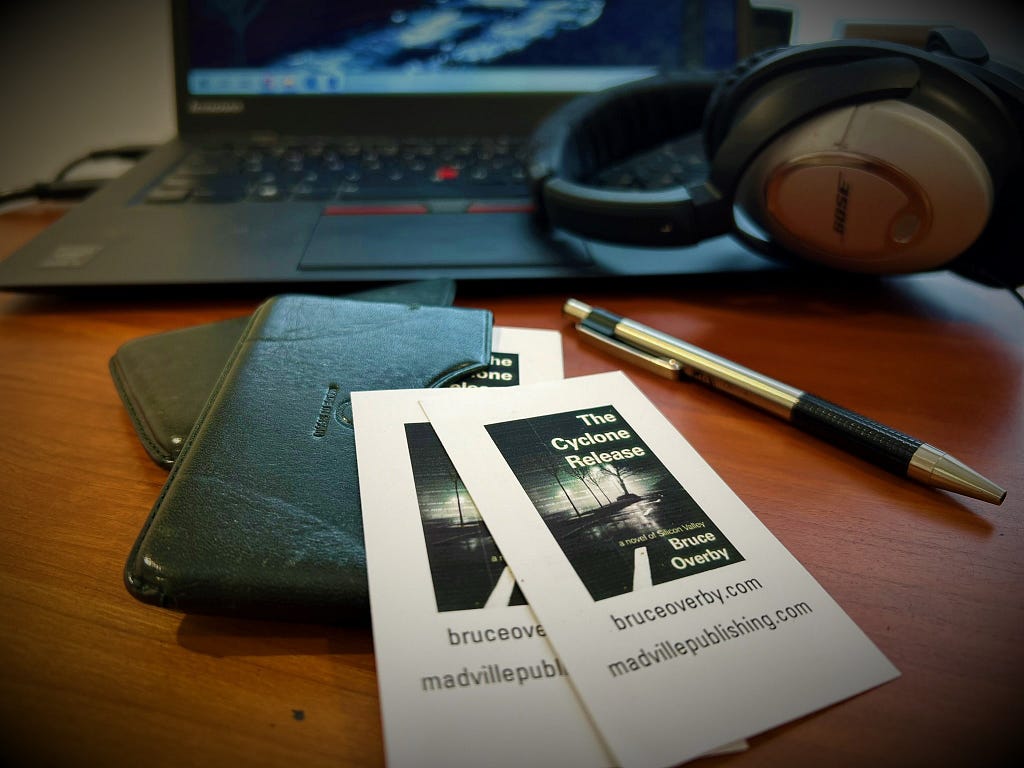
Small publishers don’t typically have budget for much publicity or marketing of your work, beyond what they do for the whole of their list. They also often come up short when it comes to some real sales drivers like audiobook and ebook production. The good ones will, however, have good industry connections for services like this, which can greatly simplify the process. What all this means is, you’ll need to decide how much cash you’re willing and able to dole out to drive sales of your book. In my case, I found a few thousand sitting in a largely dormant investment account that my wife and I agreed could be used for the book. This required some priority calls.
These are the things I decided to go ahead and pay for:
Editing
In a bit of fortunate serendipity, when I learned of my success in the Blue Moon Novel Competition, I happened to be taking a writing workshop at the Stanford Writer’s Studio, where I started seriously studying fiction writing 20 years ago. The instructor of that class, the talented and wonderful writer Angela Pneuman is not only a long-time mentor of mine, she is also a professional editor. Once I knew The Cyclone Release would be going out into the world, my publisher and I agreed that a professional editing pass would do much to ready the book for sale — which it did. This was the biggest of the big-ticket items I covered, and some of the best money I spent on the book.
Audiobook production
My publisher had a connection to a hugely talented and experienced narrator at a comparatively reasonable rate, and I’m really pleased with the results. This was the second biggest item I covered, and while I’m not sure how the sales are going at this point, I think the audiobook, available on Audible, Google Play, and most other platforms, will drive some good sales.
Consignment at local bookstores
My publisher distributes its books through Ingram, which is an excellent entrée into bookstores, but unfortunately, small publishers often don’t approve the full discount of 40% Ingram normally gives to booksellers. Small publishers do this to discourage booksellers from carrying their books, mainly because they can’t afford the return of too many unsold copies — something distributors offer to all booksellers. This is a Catch-22 for me because not only do I want to support local independent bookstores, but also, The Cyclone Release is a realistic story with a very strong local flavor. (The subtitle is “A Novel of Silicon Valley.”) So, my only option for getting the book into some local stores was to sign consignment agreements and pay consignment fees. Because my book released in mid-November, just in time for the holiday shopping season, I’m hoping having it available in local stores will prove a shrewd move.
Additional books to sell on consignment
The thing about signing consignment agreements is that I have to personally provide the books to the stores, which means I have to take advantage of the significant author discount I get and buy them from the publisher. As it happens, having these boxes of books on the floor of my home office has turned out to be a strong motivator for me to contact more local stores, and perhaps set up an online store of my own.
The things I decided not to invest in were:
Publicist support
My editor referred me to a great publicist, who I “interviewed” for over an hour on the phone, deciding in the end that the price tag ($16,000) was too rich for my blood. That hour on the phone, though, was something of a boon, as she shared a lot of excellent tips and advice free of charge. The key thing I learned from her was that professional publicists spend virtually all of their time on national and international media, often spending zero time on bookstore events. I was able to arrange a successful Launch Event at Books Inc. Palo Alto, but events like this are unlikely to generate the volume of book sales I would get from media or online sales, which, I think, is why publicists prioritize the way they do.
Paid reviews
I was leery about paying people to review my book, so I polled some of my author acquaintances who have published multiple books to see what they thought. The word I got back was “don’t do it,” which was consistent with my instincts, so I haven’t done it. I’ve heard 50 reviews on Amazon is sort of a benchmark that can catapult the visibility of a book, and so far, my loyal readers have fallen short of that, though I have gotten some great reviews from people I really respect.
The bottom line is, if your book is accepted by a small publisher, you’ll need to spend some of your own money to help the book succeed, and you’ll need to give some thought to how you prioritize that spending.
3. Don’t be afraid to advocate for yourself
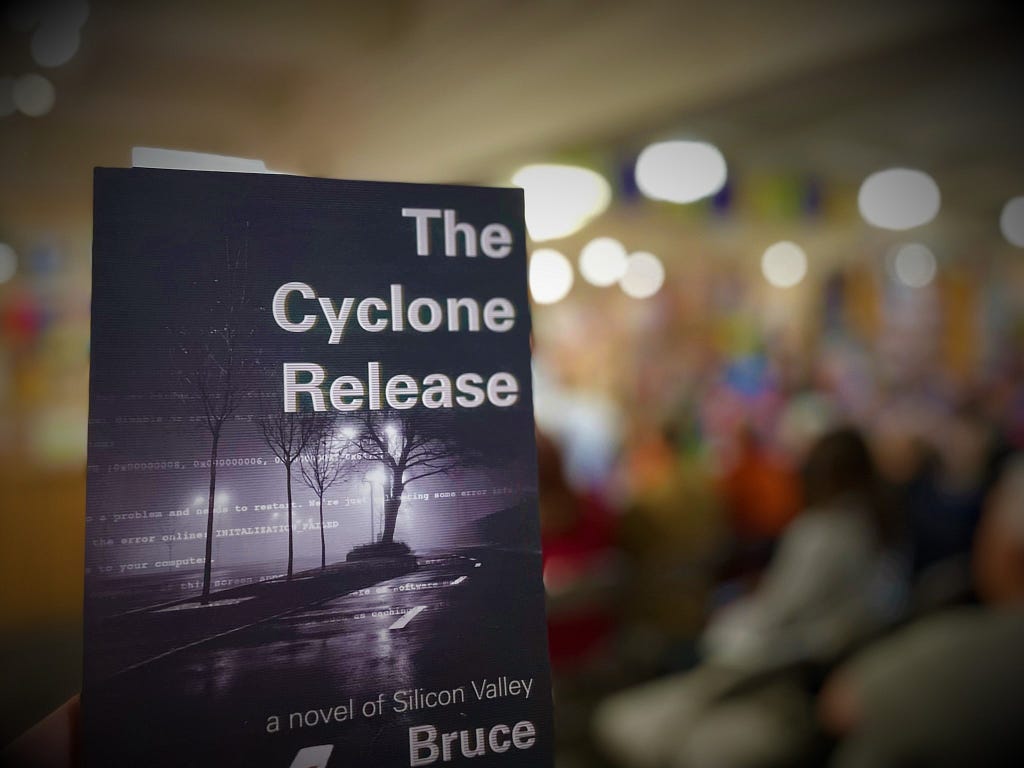
In my experience, authors of literary fiction whose work is published by traditional publishers, even small ones, tend to be reticent to sing their own praises. There is certainly a culture that says this is beneath us, and that the work should speak for itself. But even if the work can speak volumes, it will never be able to do it very loudly. (It’s a book, after all.) Writers — and particularly those whose work is published by small publishers — need to understand and continually remind themselves that it’s a business in the end. As the literary agent Chris Parris-Lamb said once at a publishing panel before an audience of aspiring authors:
“Our industry does not exist so writers can publish books. Our industry exists so readers will have something to read.”
Tough, but true.
There were three instances where I faced the fear and advocated for myself, and all of them, I believe, improved my chances for book sales:
Book design and cover
Out of college, I worked in publishing and built a background in visual design and typography. I therefore had very definite ideas about what fonts I wanted used in my book and what the final cover should look like. After some breathless email exchanges, my publisher first agreed to use the fonts I asked for, and then wisely suggested that we have a video call with the in-house cover designer and hammer out the final cover. It was a spirited discussion where I had to hold my own, but I also have to admit that I learned a lot from the in-house designer about what makes a strong cover design. In the end, and after some smart late-in-the-game changes by the cover designer, I think we were all quite satisfied with the final result. (I know I was.)
Blurbs and promotion
No novelist wants his or her work going out into the world without some glowing words of praise from prominent authors on the cover. I’m fortunate to have studied with and befriended a number of novelists who have become successful, and who were all too happy to read my novel and provide me with blurbs for my cover — with one exception. Since writing school, I have stayed in contact with my thesis advisor from those days who happens to be a wildly successful author — a Pulitzer Prize winner, in fact. After a great deal of useless rumination, I worked up the courage to ask her for a cover blurb, which she declined. She has become so prominent at this point that she no longer provides cover blurbs to anyone — which I actually think is pretty wise. She did, however, praise my book on social media, and while the post didn’t generate the wave of attention I’d hoped for, I was still hugely grateful, and I remain so.
Audiobook production
As mentioned above, the publisher had access to excellent resources for audiobook narration and production. What’s more, I was given full veto authority over the voice talent we would use. After an audition over video conference, I was quite pleased with the narrator, and looked forward to reviewing the draft audio. And review it I did, closely and carefully, generating eight pages of fixes that I sent to the narrator and publisher. The publisher seemed a little surprised at the depth and thoroughness of my review, but to his credit, the narrator wasn’t. Within a day and a half, he had made all the fixes, greatly improving the final product.
My hope for anyone reading this, and anyone who wishes for it, is that they land a contract with a large publisher who will spare no expense in promoting their work. But if you, like me, land with a small independent, you’ll have to be your own best friend and advocate.
4. Push through the noise and write
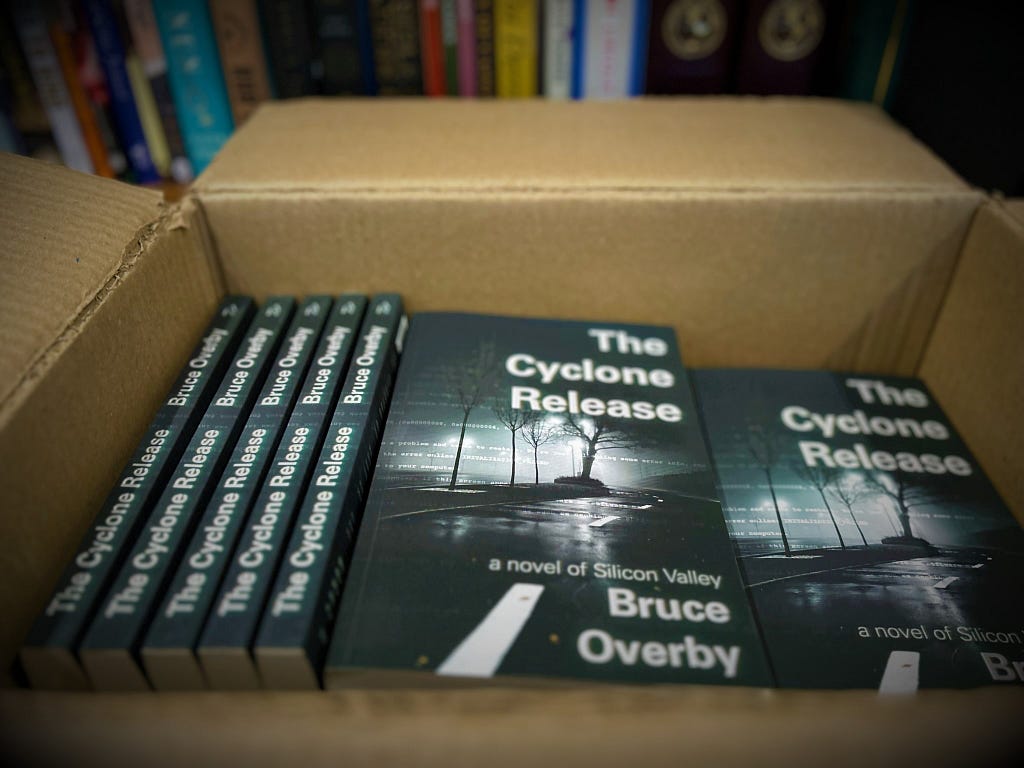
All this work trying to get sales traction, first for my soon-to-be-released book and now for my newly released book, has been a frustrating distraction, keeping me from the passionate endeavor that got me here in the first place: fiction writing. Maintaining the platform, prioritizing and closely watching the dollars I’m spending, and advocating for myself are all incredibly time-consuming, leaving little time to put pen to paper on the next novel. If you’re a working person, as I was during all the years I was working on The Cyclone Release, this would have been a non-starter for me. There would likely be no platform, or at least not one as elaborate as the one I’ve constructed; there might be money, but no time to prioritize its spending; and there would be no time to be my own champion. I retired just as I landed my book contract, and I have no illusions about how fortunate that makes me. The flip side, of course, is that I’m 63 and just publishing my first novel, so time is short for whatever comes next, meaning the pressures are coming from both sides: to promote what I have now while moving ahead with something new. My response to this is nothing new or innovative, and it’s certainly not a solution. It’s just the thing all writers must do pretty much all the time: get writing. Make the time and dive in. Think about it when you’re not writing, and write it when you are. I’ve managed almost 5,000 words on my next novel, a sequel to The Cyclone Release, and I’m charging ahead with some more pieces like this one. More than that, I’m reviewing the books I read and posting the reviews, keeping up with fellow debut authors, and turning out newsletters. I do all this because I strongly believe that all writing counts, and writers should always give themselves credit for the words whether they’re writing a brief review or working on their next novel.
As Jodi Picoult has said, “You can always edit a bad page. You can’t edit a blank page.” Writers have to write, and I feel fortunate to have that ingrained in my very being, and to have the time and freedom to do it.
5. Treasure the little things
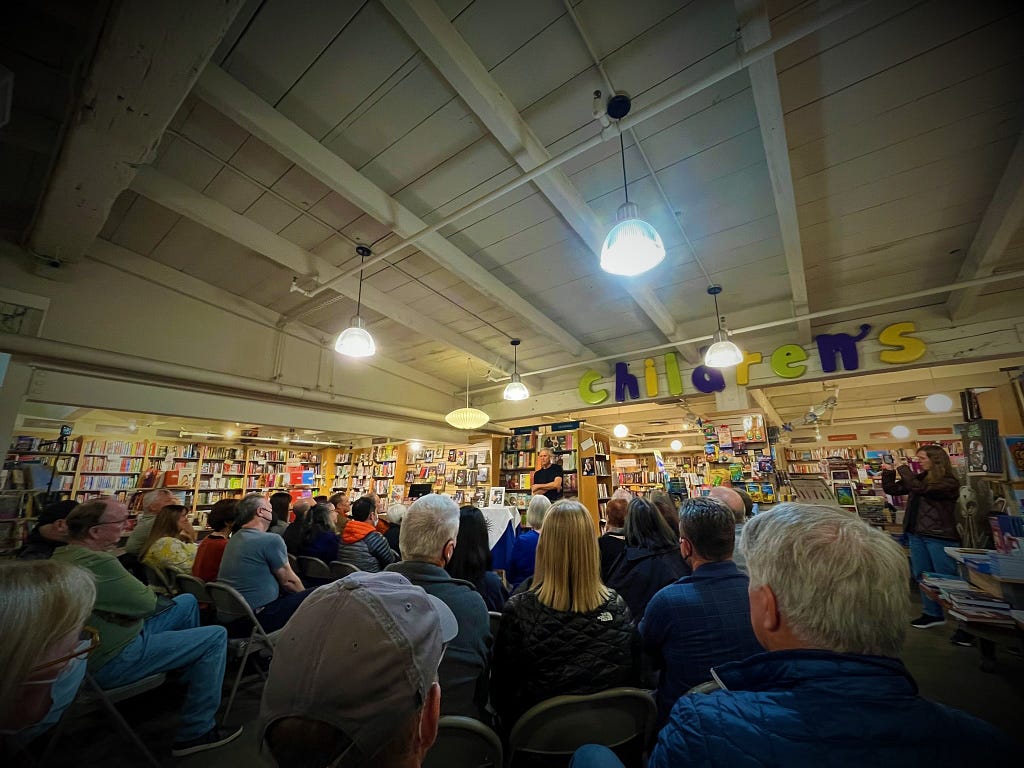
Most of you heard about this, but I must retell the story for the few who haven’t: A debut author, Chelsea Banning, blew up in the media recently not — at first, anyway — because of her startling new book, but for a very different reason: After having only two people show up at her book launch (despite having had 37 RSVPs), she innocently groused on Twitter, planning to eventually delete the tweet, and the response to this tweeted groan went viral and ultimately spread to the national media. Literary luminaries Margaret Atwood, Stephen King, Neil Gaiman, and a host of others responded to the tweet by sharing their own horror stories of sparsely attended readings — or in the case of Gaiman and Terry Pratchett, a joint reading in Manhattan attended by exactly zero people. On Twitter, of course, something like that is sure to prompt a bit of parody, some of it based on envy towards a writer whose following just exploded for the most random of reasons. I of course share in that envy, but I’ve become adept at pushing those feelings aside, realizing over time that they do nothing for my writing or my success as a writer.
So, why am I bringing this up? Because the Launch Event for The Cyclone Release was the exact opposite of Chelsea Banning’s. I had an audience of 40, which the staff at Books Inc. Palo Alto said was their largest audience of the year. My tribe came out in force to support me, something that allows me to quickly dismiss any envious grousing I might direct at Chelsea Banning and remind myself to treasure the good fortune I’ve had in getting this book out to readers. Lots of good things have happened along the way, and it’s important to cherish all of them.
In summary
Working with a small publisher has been, on balance, wonderful. A writing instructor I had once gave a seminar on university and independent presses that he started by bellowing, “The big New York publishers don’t give a shit about you!” This was a bit of hyperbole to make a point, but I can say, I have prominent writers in my circle who have bemoaned the limited creative input their big New York houses have allowed them and the grueling book tours they’re required to go on. (Sound like nirvana to you? Yeah, me too — though I can see it getting old after the 7th or 8th one.) In my case, while I had to make personal investments in both time and money, I did have significant creative input and good support from a publisher who is in it for the love of the words, verses, sentences, and stories, not the well-being of nameless, faceless shareholders. And in the end, I have to face it: This is really the only way my book was going to get into print, so that’s pretty much the end of the conversation right there.
So, if you find yourself working with a small publisher, be good and ready to:
- Find some balance with the social media vortex.
- Determine how much of your own money you’re willing and able to spend.
- Advocate for yourself.
- Push through and make time for your writing.
- Treasure the little wonders that happen along the way.
Five Things My Debut Book Launch Taught Me was originally published in The Writing Cooperative on Medium, where people are continuing the conversation by highlighting and responding to this story.
Go to Source
Author: Bruce Overby
